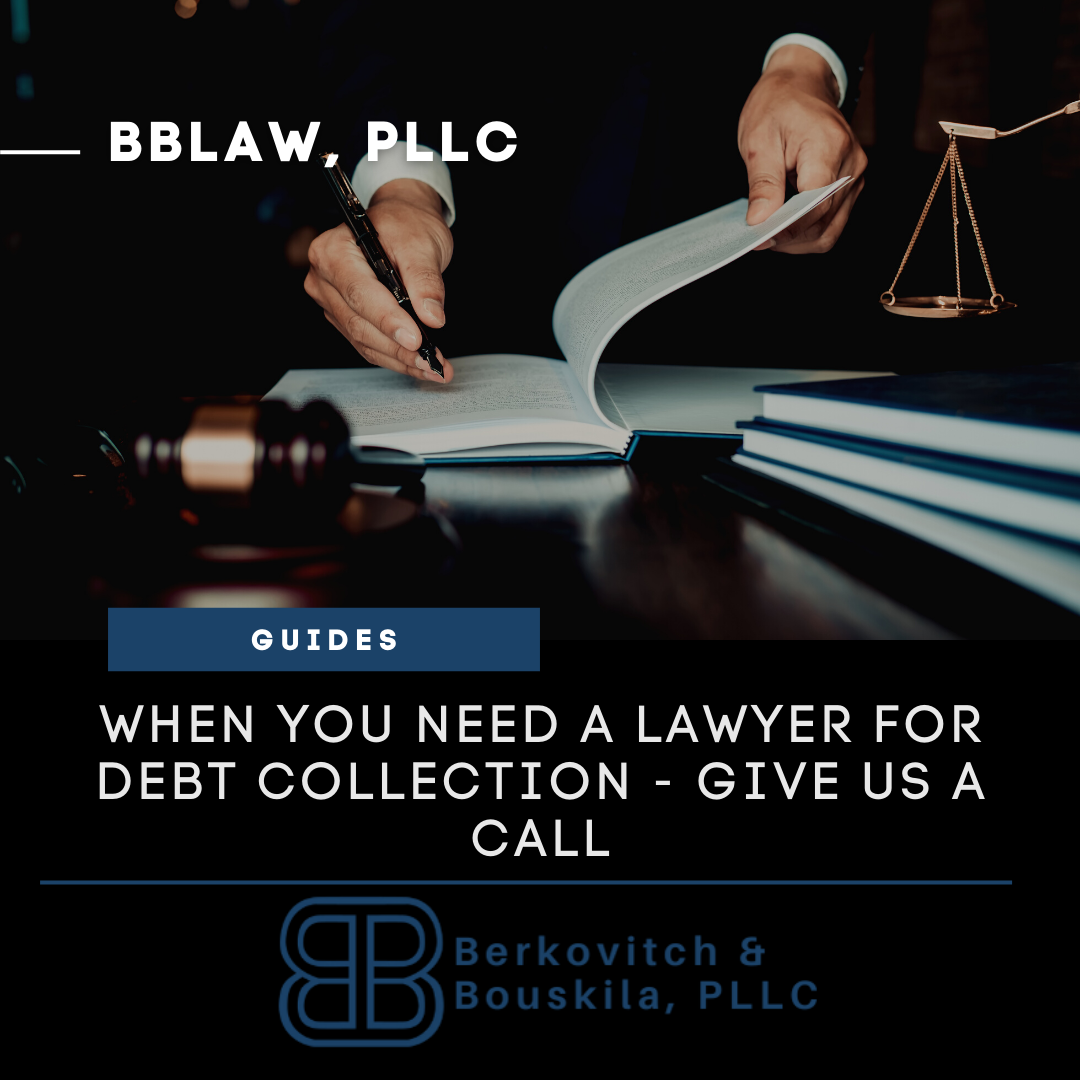Unpaid debts in collections might leave you wondering whether you need to hire an attorney and when to do so. Your current position may cause you to feel vulnerable, or you may want to learn more about how to deal with it the best way. Need a lawyer for debt collection?
Then keep reading!
When Do You Need To Hire A Debt Collection Attorney?
If you find yourself in any of the following scenarios, you may want to consider hiring a debt collection lawyer:
You want your debt collection case to go to court
Should your debt collection efforts become so important that a court order is required to recover your money? Then, you should see a lawyer.
If you go to court on your own, you are less likely to get a good result than if you hire an attorney who knows the law.
You’ll have to send out the demand letters
Sometimes, your case will end up in court even if you’d prefer not to file a lawsuit in the first place. That’s where letters of demand come into play.
Using these legal papers, you may tell the customer that if they pay a particular amount of money, they won’t face legal action. It’s possible that the threat of legal action may motivate some of your unpaid customers to make a payment before you file a lawsuit against them.
With the help of a debt collection lawyer, you can write demand letters that are both effective and convincing.
Your customer owes you more than $5,000
A collection attorney may be necessary if a customer owes you $5,000 or more in unpaid debt. When a debt is big enough to justify the expense of legal assistance, it is a smart idea to hire an attorney.
Your customer is a big company
When it comes to fighting for the repayment of their debts, larger companies often have more resources at their disposal. When it comes to pursuing corporate debts, lawyers that specialize in debt collection may be able to assist.
They are more familiar with the methods huge corporations use to utilize these resources. A lawyer can give you legal advice and file lawsuits..
What To Consider When Hiring A Debt Collection Attorney
Learn and consider these things while you’re searching for the proper debt collection attorney:
How much does a debt collection lawyer charge?
It’s common for a court lawsuit to cost hundreds of dollars to file. If you’re successful, you’ll probably have to pay your debt collection attorney a third of the money you recover, plus any extra expenses.
If you’re looking for an attorney, be sure to ask each one how much their fees are up front, and be honest with yourself about your financial ability to pay. However, some lawyers are able to work with percentage basis once you get the money.
Are the lawyer’s skills needed for your case?
Sometimes, debt collection attorneys who used to win a lawsuit against giant corporations have no idea how to handle small company bills. See whether potential attorneys are willing to share their prior experience and accomplishments with you so you can judge their strengths and weaknesses.
Do they have experience handling similar case?
Get a lawyer who has the right skill set for your situation! Check to see whether they’ve ever been in trouble with the law.
By looking for the attorney’s name on the state bar website, or by call the state bar association, you may get this information. There may be more than one bar association in a state. Contact the “required” bar association, not the “voluntary” one.
Remember: When you meet with a lawyer, bring copies of your documents on the debt and records of communication with the debt collector. You should never give somebody your originals.
A copy of letters you’ve received from the debt collector, as well as any records of phone conversations, letters to the debt collector, or other interactions, can be valuable to your attorney.
What form of debt do they specialize in?
A lawyer’s abilities aren’t the sole factor in determining whether they’ll be a good match for your situation. On the other hand, an attorney experienced in collecting debts from huge corporations may not be able to collect debts associated with the renting of small company equipment. Ask your prospective lawyer about the nature of your debt to see whether their services are appropriate for you.
How do they communicate?
Your lawyers’ schedules might be hectic, but that shouldn’t prevent them from keeping in touch with you. A good first impression of your possible debt collection lawyer’s communication procedure can tell you so much.
You should also ask your lawyer how frequently they will keep you informed during the procedure, and make sure whether their response works for you.
Do they earn testimonials or reference?
Referrals from previous clients are excellent measure to spot a reputable debt collection lawyer. It shouldn’t be a problem for them to get in touch with these references on your behalf. Use what you learn from these references to determine if the attorney is good for you.
Do they work on their own or as part of law firm?
You’re certainly familiar with the idea of a lawyer working outside of a company because they choose to be in control of their own destiny. But independent lawyers may not have resources like that law firm have. For example, BBLawPLLC have more access to resources from lawyer community than independent lawyers.
Will they be able to represent you at trial?
It is possible to have a debt collection lawyer defend you in court, but this is not always the case. Others would rather serve as advisors and have never stepped foot in a courtroom.
A lack of this choice might leave the plaintiff in a bind when it’s time to sue. Make certain you’re obtaining a lawyer who can actually go to court if that’s what you need.
Should You Hire Debt Collection Agency or A Collection Law Firm?
Both debt collection agencies and debt collection law firms pursue outstanding debts in a similar manner. In addition, the Fair Debt Collection Practices Act applies to both. When it comes to collecting debt there are several different ways that an agency or company might go about it.
You should hire a debt collection attorney if you need a legal counsel. Before you go ahead, it is critical to understand the distinctions, similarities, and limits of each.
Here are a few things to keep in mind:
Balance Size
In certain cases, debt collection law firms may need a minimum sum, such as $1,000, in order to take on employment. However, many debt collectors are willing to take even minor sums.
Agents at collection firms may have a specialization in collecting minor debts, and they may go after accounts with amounts as little as $25,000 to do so. Debt collection law companies, on the other hand, typically employ a whole team of collectors to pursue the debts.
The legal company that handles debt collection may be a small part of a much broader operation.
Fixed Fee or Percentage
To cover the cost of their services, debt collection companies may charge a set fee for each collection attempt. The collection agency charges a fee to the creditor.
The charge depends on the remaining amount. Fees often fall somewhere between 35% and 50%.
A larger fee is needed in order for both the debt collection agency and the debt collection law firm to benefit from the account. One’s account age and balance might also affect the cost.
Law companies that specialize in debt collection often charge a flat rate, generally between 25 and 33 percent, which is determined by the magnitude of the debt. Court costs may be deducted from a debtor’s judgment and returned to the creditor as part of a settlement agreement.
On the other hand, a collection agency will charge you 25 percent of your debt. For others, it may even charge you 50 percent.
While a lawyer’s fees might be expensive, a 25 percent charge is more affordable. Even if you win your case, your debtor may have to foot the bill for your legal counsel, so the amount you pay now may not matter in the end.
Some law firms that specialize in debt collection work on a contingency fee basis, which means that the creditor doesn’t pay unless the debt is collected.
The Collection Strategy
There is a big difference between debt collection companies and legal firms when it comes to what they can do. By contacting a debtor on a regular basis, a debt collection agency aims to get the debtor to pay back some or all of the money they owe.
Letters and phone calls are two common methods of contacting one another. In addition to using these measures, debt collection companies may potentially go farther in their pursuit of the debt.
Law firms that specialize in debt collection like BBLawPLLC work with attorneys who are prepared to go to court if necessary. A lawyer may submit the documents and perform legal service in order for the debtor to know that a court date has been set.
It is common for such litigation to lead to default judgments in favor of the defendant. After getting a judgment, the debt collection law firm may garnish the debtor’s wages, put a lien on any non-exempt property, and take money from rental or business income.
Speed and Urgency
The speed with which the company can recoup the debt is a key factor in this choice. Most of the time, debt collection organizations will make an effort to collect the debt, but if they are unsuccessful, they will transfer the case to a collection law firm.
A collection agency can’t force a debtor to pay or initiate a lawsuit that moves you closer to this aim. Because of this, debt collection agencies may be reluctant to give up the debt even if there is no indication that they would be successful because they must pay a large fee to the debt collection law company.
In this case, a debt collection agency may be unable to collect on a debt for months or even years at a time.
Debt collectors, on the other hand, may send demand letters that can force debtors to take action before a formal lawsuit is filed. Attorneys are the only ones who can take your case to court and get a binding decision from a judge.
A law firm that specializes in collecting on outstanding debts may be able to sue the creditor more quickly, resulting in a speedier recovery of the debt.
If a debtor is afraid of being sued and knows about the limits on debt collection agencies, they might be less likely to ignore calls from lawyers.
Legal Assistance
For the best comparison, creditors should speak with reputed debt collection agencies and legal firms before making their final selection. There are a lot of things to think about, like how much is owed, what kind of debt it is, the interest rate, and how quickly the creditor wants to be paid back.
The Probability That A Customer Will Pay
If you’re sure that the customer will pay, you could choose to start with an agency. If your customer doesn’t intend to pay, you might save time and money by going directly to BBLawPLLC law firm.
How Much You Actually Need To Go To Court
Attorney fees might be prohibitively expensive. This is a situation where you may either use a collection agency or just let the bill go.
In certain cases, it may be preferable to ignore past-due debt altogether. New debt case may be a more reliable to deal with in court.
Takeaway
When deciding whether or not to pursue legal action, it is important to balance the advantages and disadvantages of working with a collection agency and an attorney.
Contact our support if you have any question or not sure what you shoud do next.







Leave A Comment